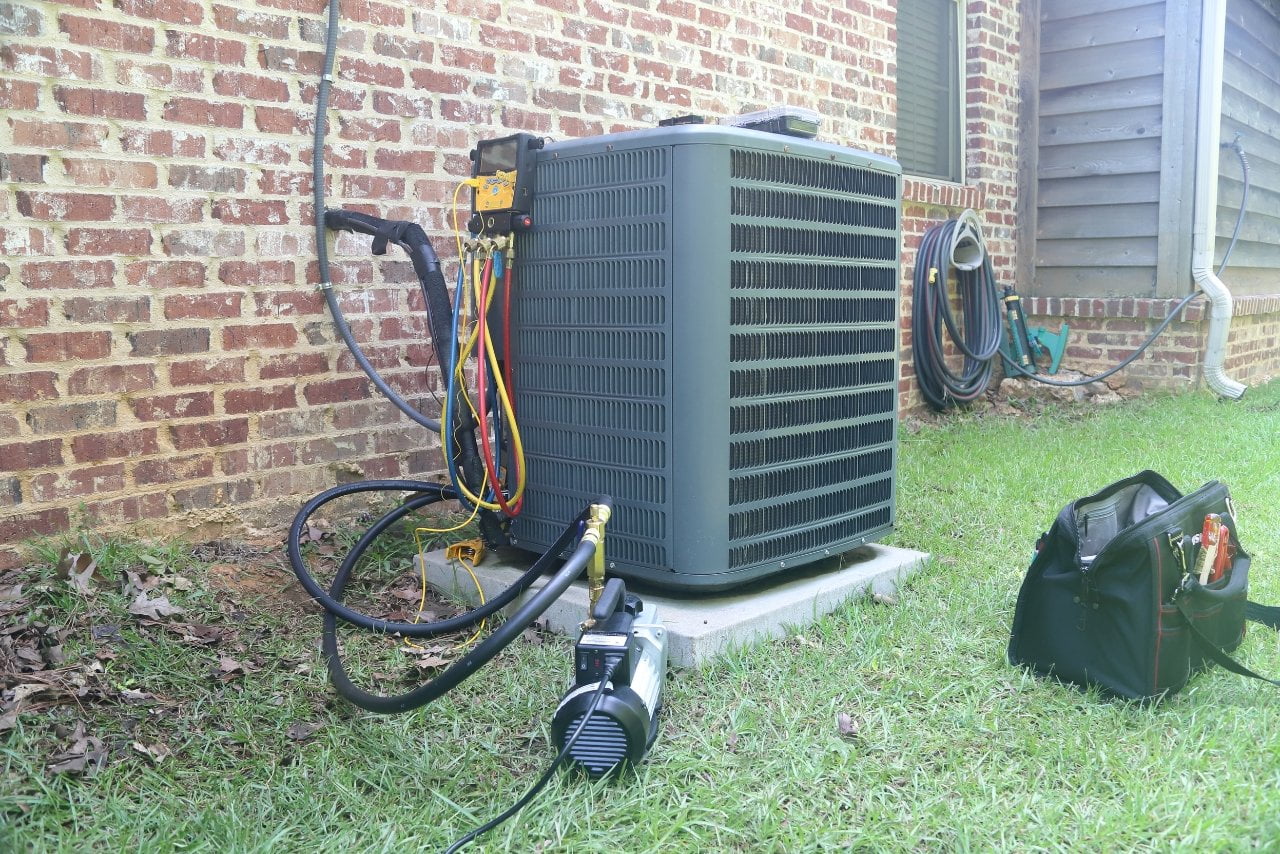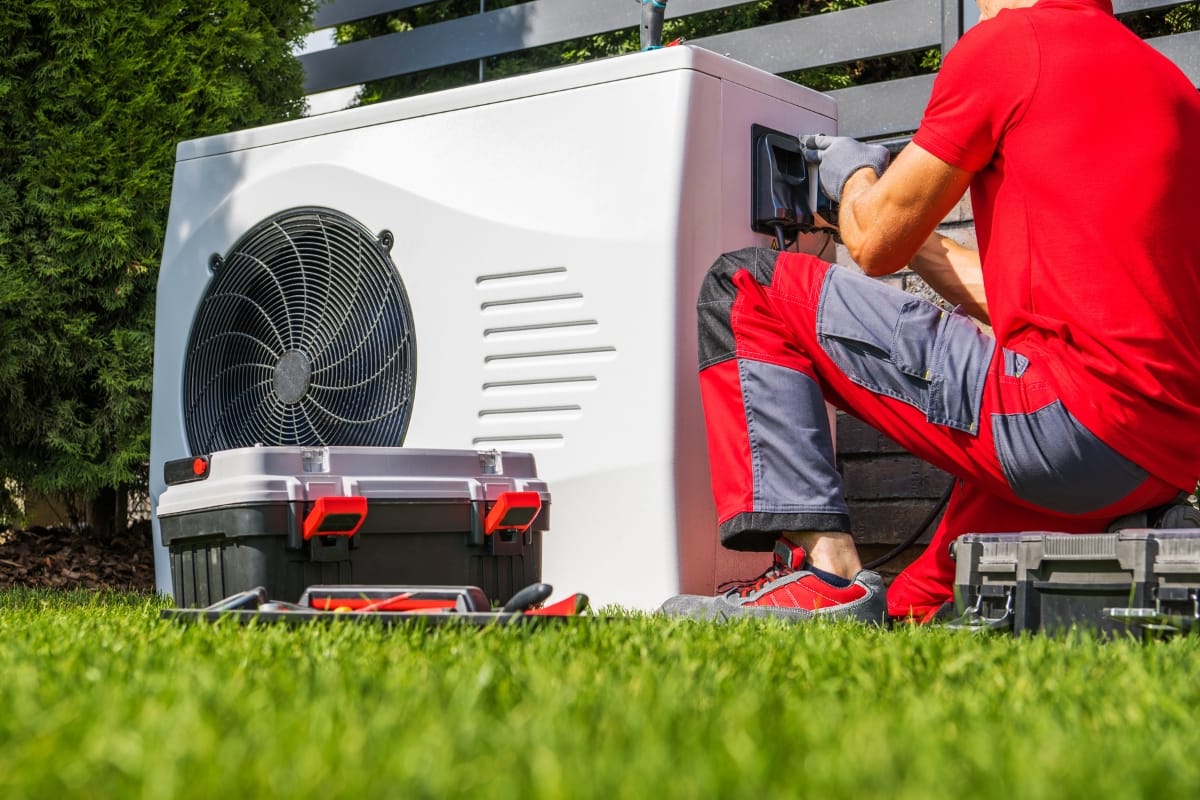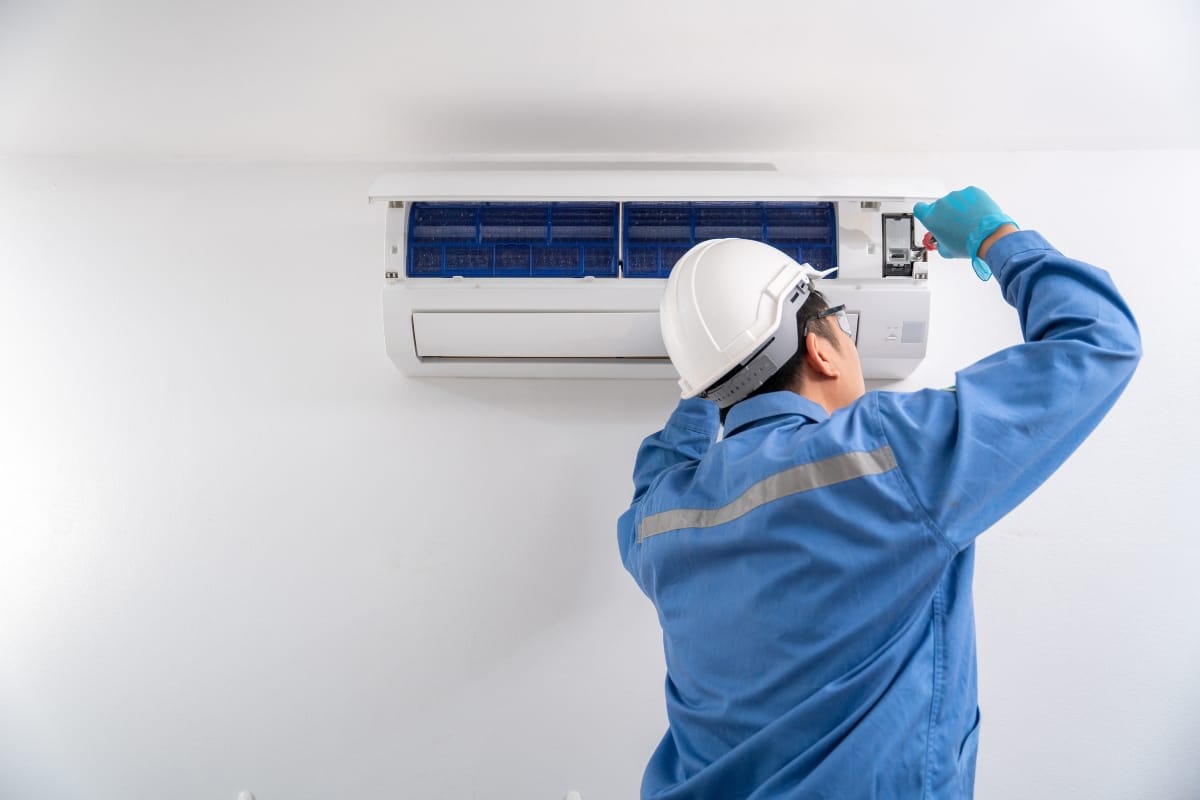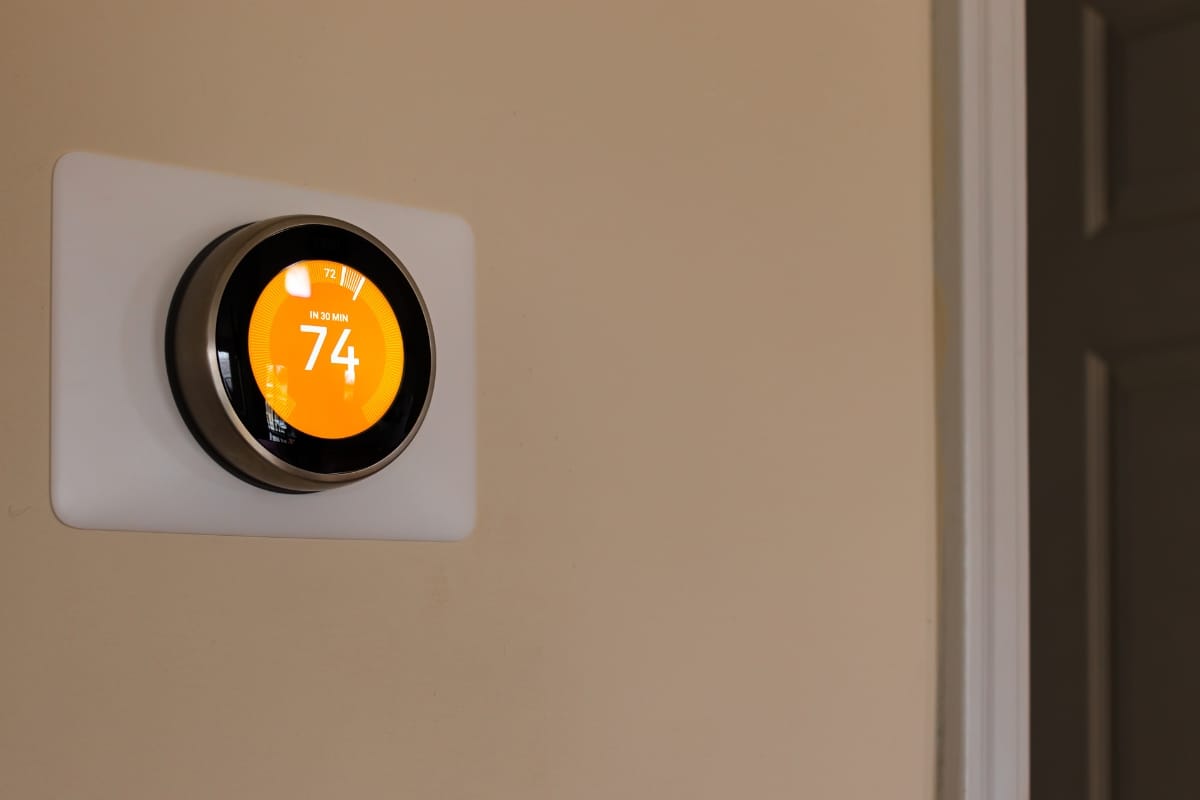A refrigerant is a critical element in cooling technology, and it needs to be kept at the right levels to ensure that temperatures remain consistent. That’s why it’s important to understand the concept of low refrigerant levels and how to diagnose and address them. So in this blog, we’ll discuss the basics of low refrigerant levels and how to tell when they might be an issue. We’ll also give some tips on how to fix the problem. So read on to better understand the warning signs and the solutions for low refrigerant levels!
How To Address Low Refrigerant Levels
What Are Low Refrigerant Levels?
Low refrigerant levels can spell trouble for any cooling system, from air conditioners to refrigerators. If you’ve been hearing strange noises or noticing that your equipment isn’t working as it should, it’s possible that low refrigerant levels could be the culprit! Understanding what these levels are and how to address them is key to preserving the performance and lifespan of your cooling systems.
Here’s how refrigerant works both in refrigerators and AC units.
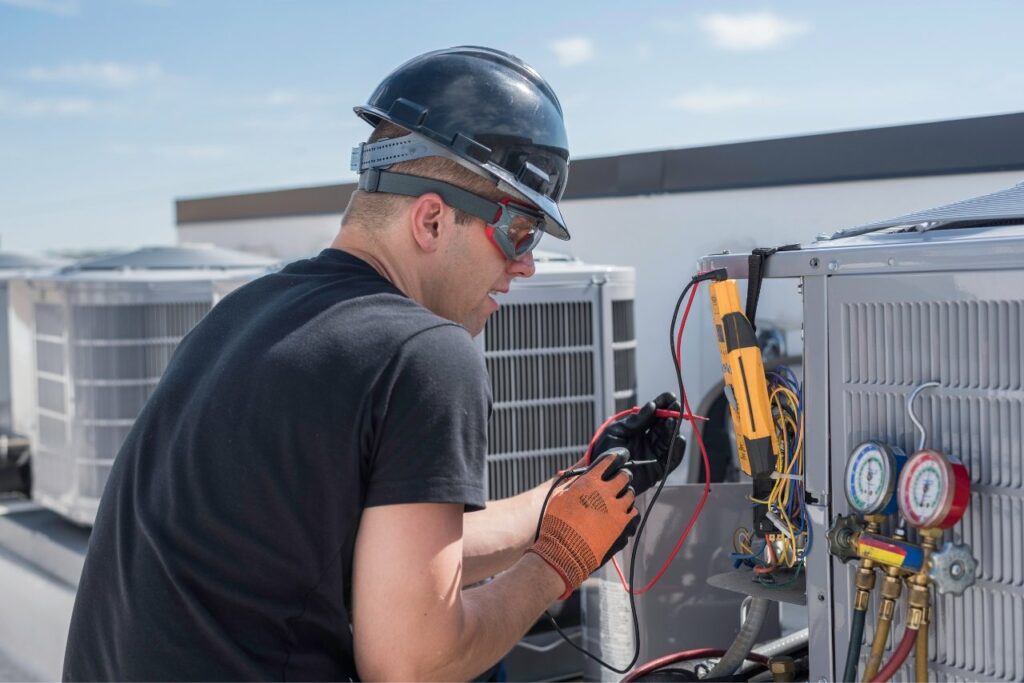
Warning Signs Of Low Refrigerant Levels
Knowing the warning signs of low refrigerant levels can help prevent a costly breakdown! It’s important for every homeowner or business owner to know the early warning signs of low refrigerant levels in their HVAC system, as failure to address this can lead to costly repairs and breakdowns. Fortunately, there are a few key indicators that you can look out for that may indicate that the refrigerant levels in your system are in need of attention.
Insufficient cooling is one of the most common warning signs of low refrigerant levels. If the air being produced by your system is not reaching the desired temperature or is lukewarm, then it could mean that the system’s refrigerant levels are low. Additionally, if your system is running constantly without cycling off as it should, then it’s likely that your system is not cooling efficiently and its refrigerant levels may be too low.
You may also hear strange noises coming from your system, such as squealing, screeching, or grating, which could be an indication that the system is not getting enough refrigerant. You may even find the presence of ice or frost on the lines leading to the compressor or in other parts of the system. This could also signal that the refrigerant levels are too low and need attention.
By staying alert for these warning signs and addressing any issues that may arise in a timely manner, you can help ensure that your HVAC system continues to operate in peak condition and avoid costly breakdowns. Knowing the early warning signs of low refrigerant levels can be the difference between a successful repair and a costly replacement.
Understanding The Causes Of Low Refrigerant Levels
Refrigerant levels in air conditioners and heat pumps are critical to their operation, as they are responsible for moving heat out of a home. This is why it’s important to be aware of factors that can lead to low refrigerant levels so that you can take the necessary steps to keep your unit running without issue.
Low refrigerant levels can be caused by a variety of factors:
- The most common cause is a slow or undetected leak in the unit’s lines, coils, or solder joints. While these leaks may occur naturally over time due to wear and tear, they can happen suddenly and unexpectedly due to faulty installation or design problems.
- Additionally, a refrigerant that was not properly charged during installation can also lead to low levels.
- Poor maintenance practices, such as failing to repair leaks or not replacing hoses, can also result in below-normal refrigerant levels.
- Contamination of hoses and connections with dirt, dust, and insects can also be to blame.
- Finally, an incorrect type of refrigerant or an excessively high-temperature cycling setting can also cause low refrigerant levels.
By being aware of these potential causes and taking proactive steps to address them, you can help ensure that your unit remains efficient and problem-free.
Potential Risks Of Low Refrigerant Levels
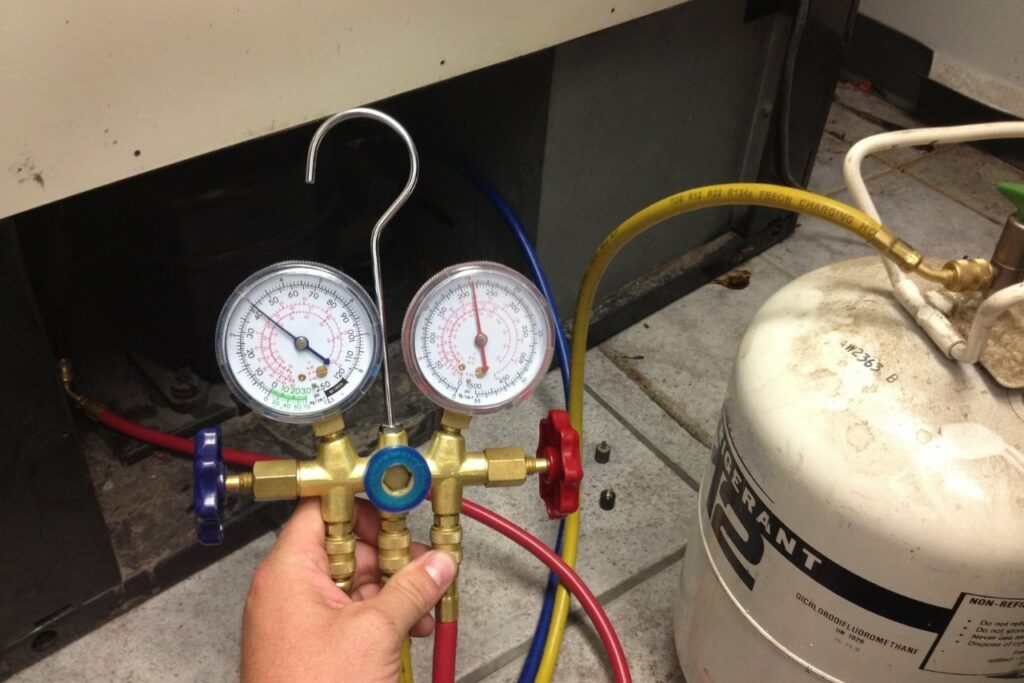
The risks of low refrigerant levels in your air conditioning and refrigeration systems cannot be understated. Low refrigerant levels can have a wide range of adverse effects and can lead to increased expenses in the long run. This article will explain the potential risks associated with low refrigerant levels and how to address the issue.
Low refrigerant levels can cause a variety of issues ranging from reduced cooling capacity to damage to the compressor. Reduced cooling capacity is often the most noticeable symptom of low refrigerant levels, as the system simply won’t be able to cool the space as quickly or efficiently as it should. Additionally, low refrigerant levels can cause other components in the system to suffer, leading to higher energy costs and possible breakdowns. The compressor is especially vulnerable to damage due to low refrigerant levels, as the higher pressure caused by less refrigerant can lead to major issues.
Fortunately, addressing low refrigerant levels is relatively straightforward. A qualified technician can easily assess the level of refrigerant in the system and top it off as needed to return it to normal levels. Doing this soon after noticing reduced cooling capacity is key, as it can prevent more serious damage like compressor failure down the line.
In short, low refrigerant levels should not be taken lightly. Paying attention to the signs of low refrigerant levels and addressing the issue as soon as possible are essential steps in keeping your air conditioning and refrigeration systems running as efficiently and safely as possible.
How To Avoid Low Refrigerant Levels?
The key to avoiding low refrigerant levels is understanding how they develop, and knowing how to avoid them. Here’s what you need to know.
- Improper installation can cause a system to lose the right amount of refrigerant, or a leak in the system could be the culprit. So keeping an eye on your refrigeration system’s pressure and temperature readings can help you identify any problems before they become major issues.
- Regular maintenance and cleaning of your system can also keep it in good condition.
- Another way to avoid low refrigerant levels is to choose the right type of refrigerant for your system. Different types of refrigerants can have different boiling points and vapor pressures, so make sure to get expert advice when selecting one for your system. By using the correct type of refrigerant, you can help extend the life of your system and avoid potential problems.
- Finally, it’s important to check and replace your refrigerant levels on a regular basis. This can help ensure that your system is functioning properly and that your space is kept at the right temperature. If you’re not sure how to do this, contact a professional HVAC service technician who can help you.
Understanding low refrigerant levels and how to address them is the key to keeping your system running efficiently. By following expert advice, selecting the appropriate type of refrigerant, and inspecting and replenishing refrigerant levels frequently, you can ensure that it performs optimally.
Getting To The Bottom Of Low Refrigerant Levels
When dealing with low refrigerant levels, it can be tough to know where to start. While some minor issues may be able to be solved on your own, more serious problems with your HVAC system could require the help of a professional. Professional help is the best and safest way to take care of low refrigerant levels and get your AC unit back in working order. Here’s why.
Professional technicians know exactly how to identify, diagnose and repair the issue. They have the right tools and skills to find the root cause, evaluate the system and make sure that it is up and running again as soon as possible, without compromising the safety and reliability of your unit. Additionally, many professionals have access to specialized parts that are designed to replace refrigerant levels accurately and quickly, helping you avoid long-term problems as a result.
If you’re having issues with low refrigerant levels, don’t handle it alone. Make sure you seek out the help of a professional technician for any air conditioning services. They can help ensure the job is done properly, the first time around.
Concluding Thoughts On Low Refrigerant Levels
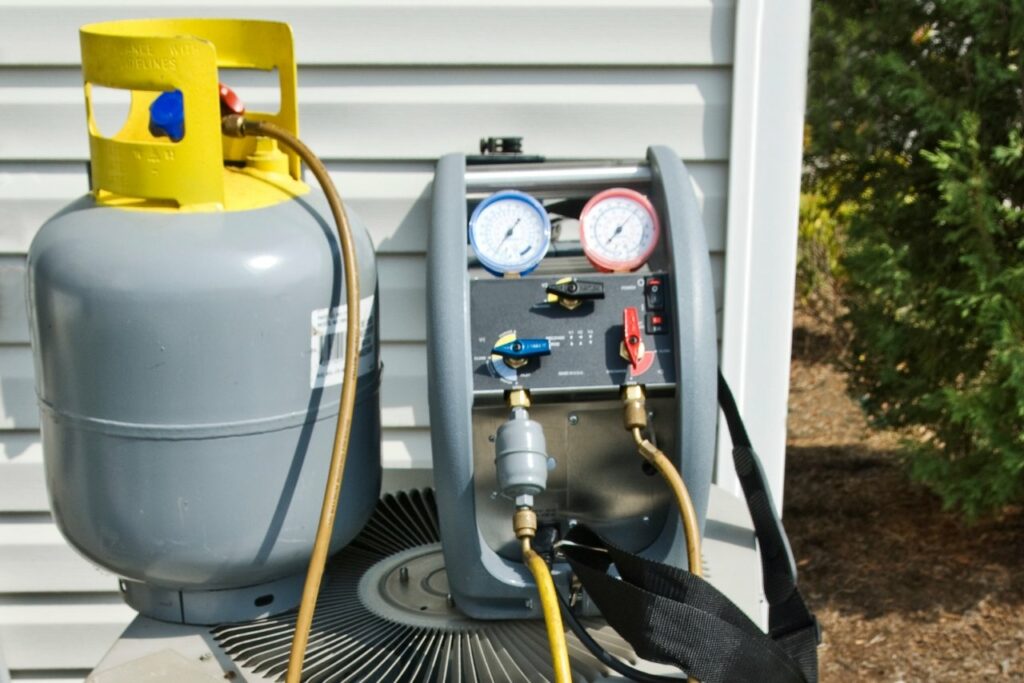
The issues caused by refrigerant levels that are too low can range from mild to extreme, but the one thing that remains certain is that they can have an adverse impact on your HVAC system. Understanding the causes and proper ways to address these problems is key to keeping your air conditioner running in top shape.
Taking proactive measures to make sure your refrigerant levels are adequately maintained can also help you avoid any costly repairs or replacements. With the right knowledge, maintenance practices, and care, you can ensure your HVAC system is running at a level that promotes healthy indoor air quality and efficient operation.
Are you still having issues with low refrigerant levels? Get in touch with CoolPro Atlanta for assistance. Give us a call at (770) 694-6232 to schedule an appointment.

